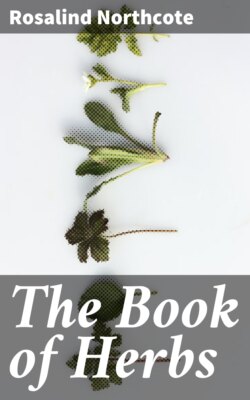Читать книгу The Book of Herbs - Rosalind Northcote - Страница 24
На сайте Литреса книга снята с продажи.
Fennel (Fæniculum vulgare).
ОглавлениеTable of Contents
Ophelia. There’s fennel for you and columbines.
Hamlet, iv. 5.
Fenel is for flatterers,
An evil thing it is sure,
But I have alwaies meant truely
With constant heart most pure.
A Handfull of Pleasant Delightes.—C. Robinson.
Christopher. No, my good lord. Count. Your good lord! Oh! how this smells of fennel!
The Case Altered, ii. 2.—Ben Jonson.
“Hast thou ought in thy purse?” quod he.
“Any hote spices?”
“I have peper, pionies,” quod she, “and a pound garlike
A ferdyng worth of fenel-seed for fastyng dayes.”
Piers Plowman.
Oh! faded flowers of fennel, that will not bloom again
For any south wind’s calling, for any magic rain.
The Faun to his Shadow.—N. Hopper.
“Sow Fennel, sow Sorrow.”—Proverb.
Few realise from how high an estate fennel has fallen. In Shakespeare’s time we have the plainest evidence that it was the recognised emblem of flattery. Ben Jonson’s allusion is almost as pointed as Robinson’s. It is said that Ophelia’s flowers were all chosen for their significance, so, perhaps, it was not by accident that she offers fennel to her brother, in whose ears the cry must have been still ringing,
“Choose we; Laertes shall be king!”
with the echo:—
“Caps, hand, and tongues, applaud it to the clouds,
‘Laertes shall be king, Laertes king!’ ”
Nor was it only in our own land that Fennel had this significance, for Canon Ellacombe quotes an Italian saying: “Dare Finocchio” (to give fennel), meaning “to flatter.” As to the reason that fennel should be connected with sorrow, the clue is lost, but the proverb is said still to live in New England. The conversation which takes place in “Piers Plowman,” between a priest and a poor woman, illustrates a use to which fennel was put in earlier days. The poor got it, Miss Amherst says, “to relieve the pangs of hunger on fasting days.” But it was by no means despised by the rich, for “As much as eight and a half pounds of Fennel seed was bought for the King’s Household (Edward I., 1281) for one month’s supply.” She quotes from the Wardrobe Accounts. Our use either of Common Fennel, or Sweet Fennel, or Finocchio is so limited that the practice of Parkinson’s contemporaries shall be quoted. “Fenell is of great use to trim up and strowe upon fish, as also to boyle or put among fish of divers sorts, Cowcumbers pickled and other fruits, etc. The rootes are used with Parsley rootes to be boyled in broths. The seed is much used to put in Pippin pies and divers others such baked fruits, as also into bread, to give it the better relish. The Sweet Cardus Fenell being sent by Sir Henry Wotton to John Tradescante had likewise a large direction with it how to dress it, for they used to white it after it hath been transplanted for their uses, which by reason of sweetnesse by nature, and the tendernesse by art, causeth it to be more delightfull to the taste.” “Cardus Fenell” must have been Finocchio.
